Lakota Pecan Tree
Description
Protogynous Type II
Known for high yields! High-quality nuts shell easily into halves, yielding cream-to-golden kernels with rich flavor. Early maturing variety. Tree develops a strong, wind-resistant structure. Originates from Brownwood, TX in 1964. Introduced in 2007. Disease-resistant to pecan scab. Ripens in mid- to late-October. Grafted. Best pollinators: Pawnee or Desirable.
Survival Guaranteed!
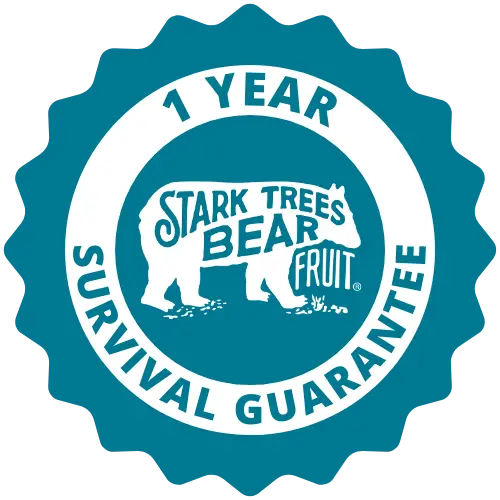

Since 1816, Stark Bro’s has promised to provide customers with the very best fruit trees and plants. It’s just that simple. If your trees or plants do not survive, please let us know within one year of delivery. We will send you a free one-time replacement, with a nominal shipping fee of $9.99. If the item in question is not available, we can issue a one-time credit to your account equaling the original product purchase price or issue you a refund. Read more about our warranty policy.
Characteristics
| Bloom Color | Green |
| Distance To Pollinator | 75 - 250' |
| Fruit Color | Brown |
| Fruit Size | Small - Medium |
| Hardiness Zone Range | 6A - 9 |
| Pollination | Pollinator Required |
| Ripens/Harvest | Mid To Late October |
| Shade/Sun | Full Sun |
| Soil Composition | Loamy |
| Soil Moisture | Well Drained |
| Soil pH Level | 6.0 - 6.5 |
| Texture | Crunchy |
| Years to Bear | 6 - 7 |
Size & Spacing
Mature Size
Recommended Spacing
Zone Compatibility
Pollination
Tools & Supplies
Planting & Care
Learn all about how to grow pecan trees in The Growing Guide. An entire section of our website dedicated to your growing success.
Shipping Information
Arrives when it's time to plant
Questions & Answers
Lakota is zoned 6a-9, so it should do well.
Planting approx. 75 feet away might be OK. To the best of my knowledge the juglone toxicity that the pecan roots puts out is limited to about 50 feet.
I agree with that this sounds like Scab but could also be damage from what is call the Hickory shuck worm. To get correct it Scab one can use Thiomyl earlier in the year use a hoses in spaying needs continue spraying the problem is higher humidity and fungal diseases go well together and are the major problem for Growers with this issue maybe causing them to fall
Yes, it is generally recommended to reduce or stop watering pecan trees before harvesting. Here's why:
1. Encouraging Nut Maturation:
As pecans near maturity, usually in late summer to early fall, reducing water helps signal the tree to shift its energy towards ripening the nuts rather than continuing vegetative growth. This ensures that the nuts reach their full size and the shucks (outer shells) begin to split.
2. Preventing Disease:
Excessive moisture close to harvest time can promote fungal diseases like pecan scab, which can affect nut quality. Reducing water helps lower the humidity around the trees and reduces the risk of disease.
3. Improving Nut Quality:
Watering too close to harvest can cause the nuts to absorb excess moisture, which can result in poor kernel development and reduced storage quality. Cutting back on water encourages the nuts to harden and dry properly.
Timing:
Gradually reduce watering about 4 to 6 weeks before harvest. This depends on the variety and local weather conditions. After the pecan shucks begin to open, you can stop watering altogether to facilitate easier harvesting.
Reducing water before harvesting pecans helps to promote nut ripening, reduce disease risk, and ensure good storage quality.
That will depend upon which option you choose. Please see the "Choose an option" dropdown menu near the top of the page, which will show you the various sizes/options that are available.
It would depend on what is available and if it is potted or bare root. Currently this is out of stock so I can not offer a size at this time.
We appreciate you reaching out to us. We use several different rootstocks, depending upon the desired result and what is available. For that reason, we're unable to guarantee a specific rootstock. I recommend planting a new tree as it sounds like the root stock has taken over.
If you have any further questions please don't hesitate to reach back out to us. Have a great day!
We appreciate you reaching out to us. Carya illinoinensis
If you have any further questions please don't hesitate to reach back out to us. Have a great day!
Other trees in the walnut family such as Persian or English walnuts, butternuts, pecans, and shagbark hickory also produce juglone but at smaller concentrations than black walnut. It's rare that these trees will harm juglone sensitive plants.
If you would like us to ship your order at a different time, please contact our Customer Support Team at 800.325.4180. We would be glad to help you arrange what suits you and your growing zone best.
Customer Reviews
-Dr. T Toccoa, Ga

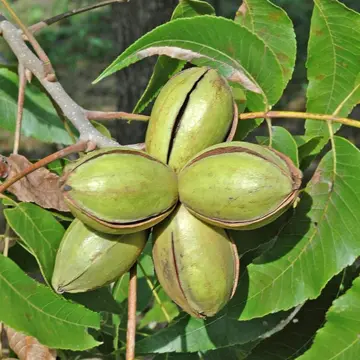
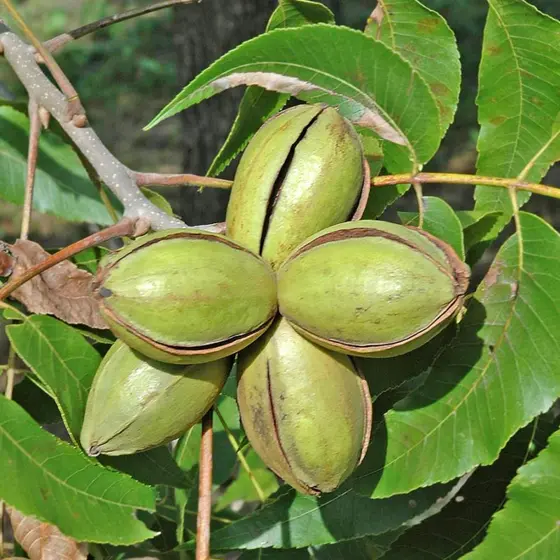
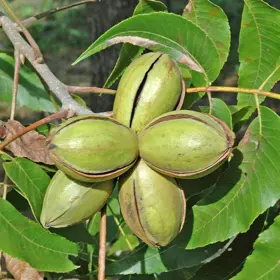
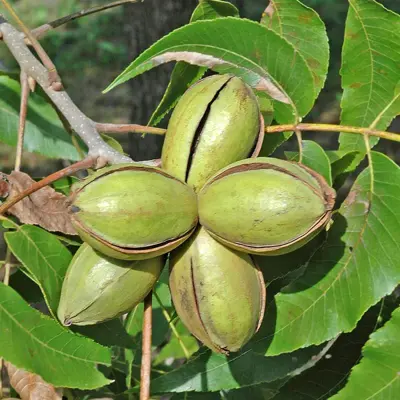
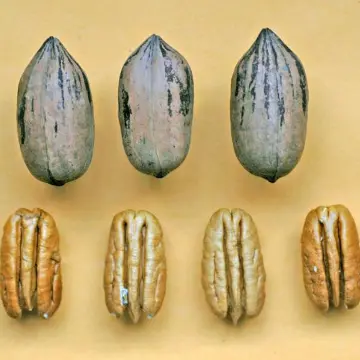
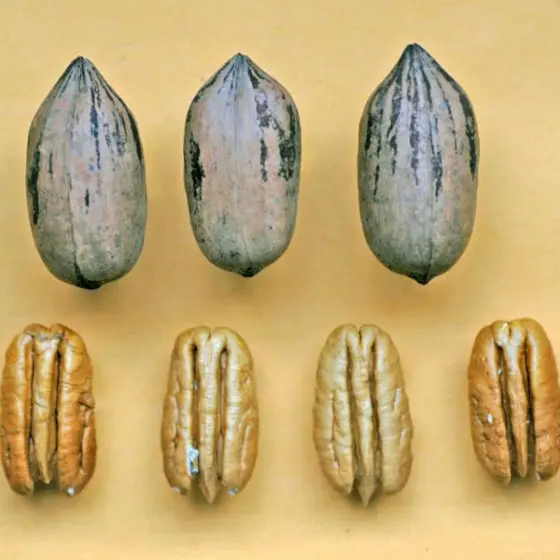
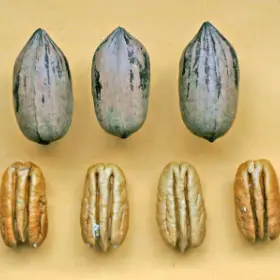
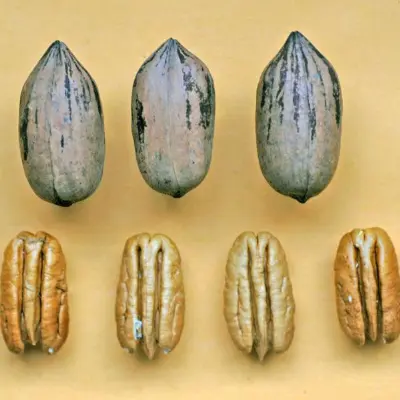
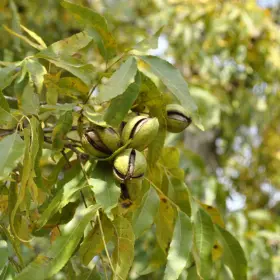
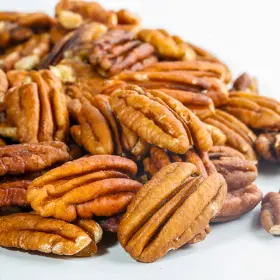
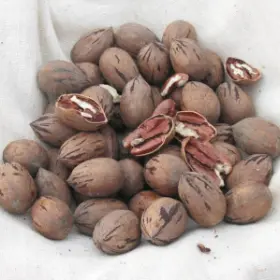
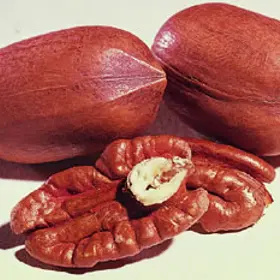
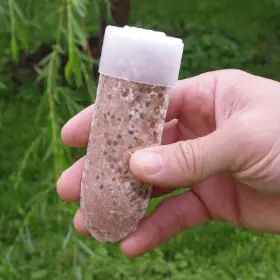
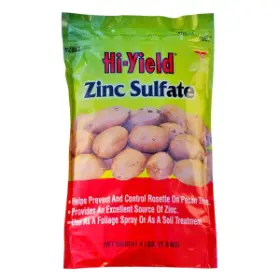
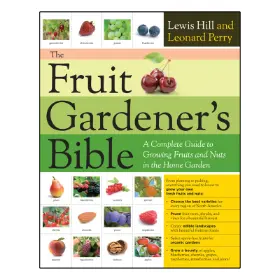
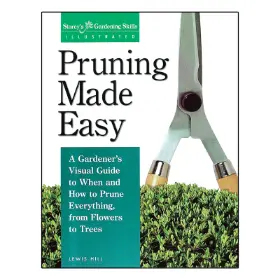

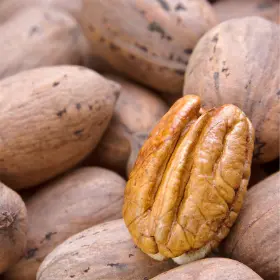
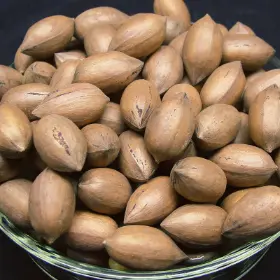
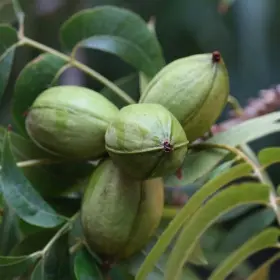
Growing in my yard
It is a good starter plant, and a good for pollen.
Disease resistant
I drunk